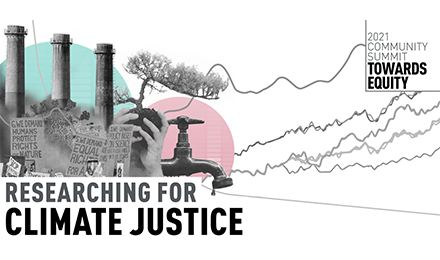A panel of advocates, researchers, policy-makers and solution-seekers gathered virtually on May 19, 2021 for a critical and compelling conversation about researching for climate justice.
Climate justice is an approach that embeds climate change within social justice and recognizes that the people most negatively impacted by climate change are those least responsible for creating those impacts and those least able to mitigate or adapt to them. Climate justice also requires that climate solutions use the lens of justice and equity. As an example, climate justice requires governments to not aggressively rush towards climate actions without considering the ways those actions may disproportionately impact vulnerable people and groups.
Rueben George, a member of the Tsleil-Waututh Nation, opened the event. George is the manager of Sacred Trust, an initiative of the Tsleil-Waututh Nation mandated to stop the Kinder Morgan Trans Mountain pipeline and tanker project. Moderator Am Johal, the director of SFU’s Vancity Office of Community Engagement and co-director of SFU’s Community-Engaged Research Initiative, then introduced a panel of seven speakers and three respondents who each offered a unique perspective on key questions about climate justice including:
- What is climate justice?
- What are the root causes of climate injustice?
- Why should we strive for climate justice?
- Whose voices should researchers and students concerned about climate justice listen to and amplify?
- What are some of the barriers towards embracing climate justice in research and policy?
A key barrier identified during the discussion was the difficulty of developing clear evaluation processes and targets to measure climate justice. This challenge was related to an issue raised by all of the panelists: the need for better data to understand and respond to climate injustices. Specifically, disaggregated demographic data is needed to identify how different groups are experiencing the impacts of the climate crisis.
The conversations from this event will inspire the direction of future events and content as part of Towards Equity, SFU Public Square’s 2021 Community Summit series. PICS is proud to be a partner in the Researching for Climate Justice event.
Find out more at SFU Public Square.

